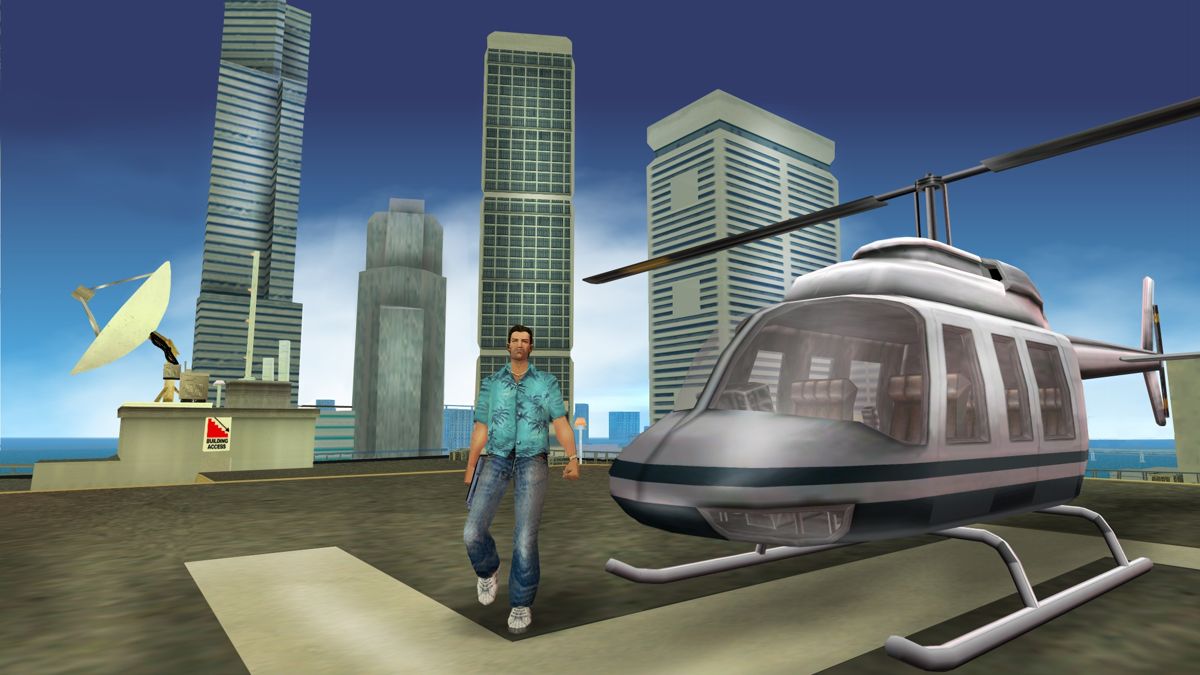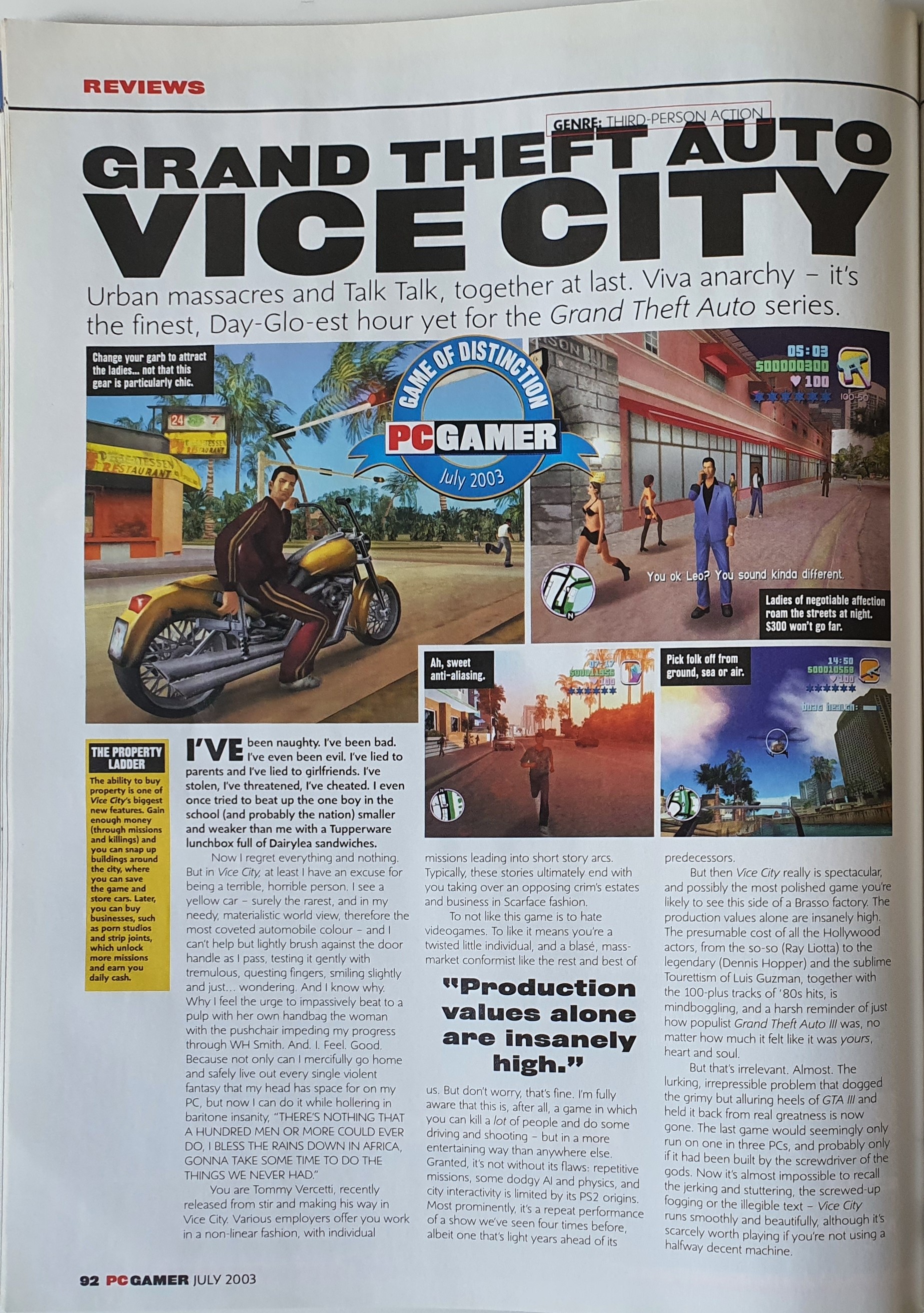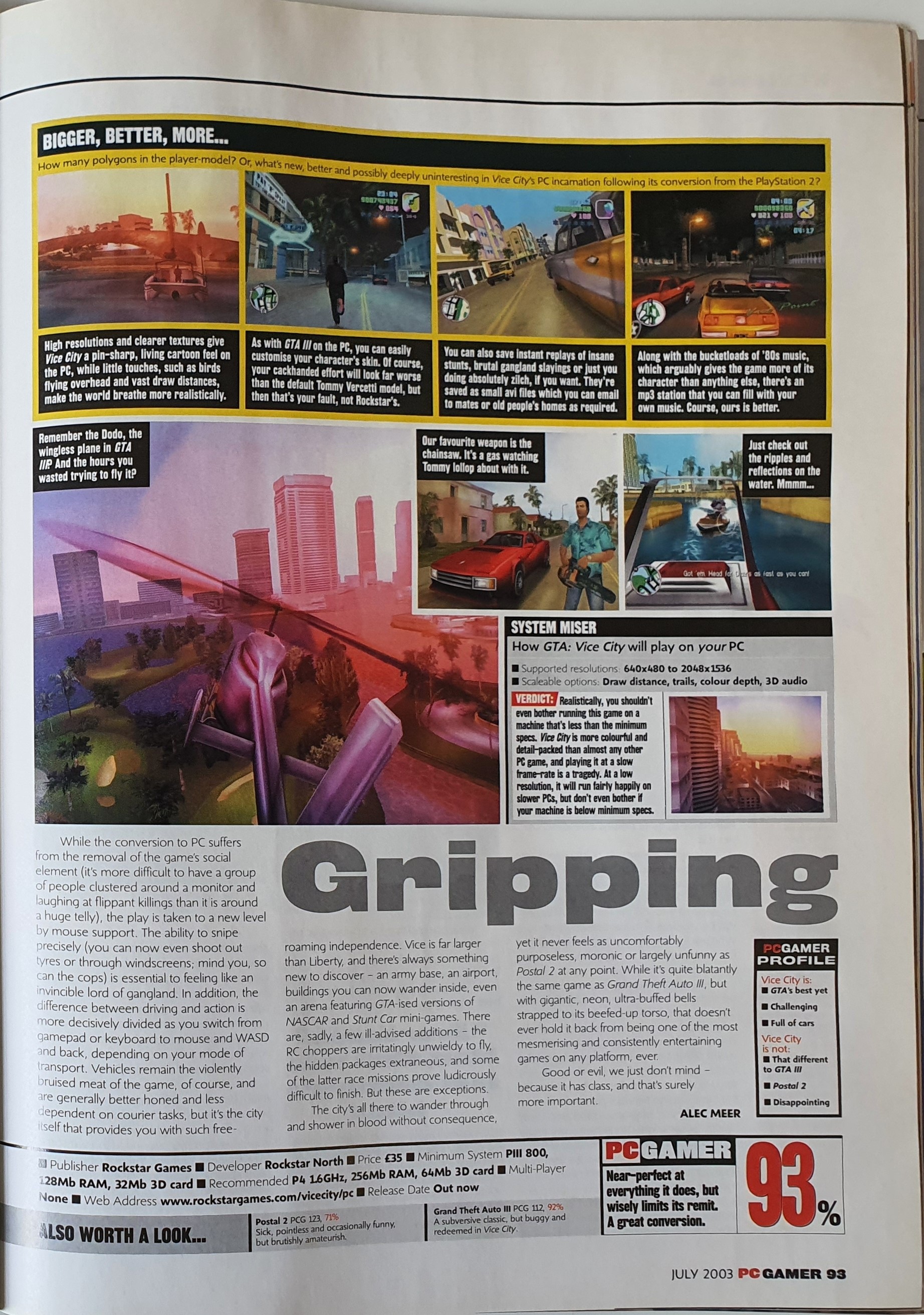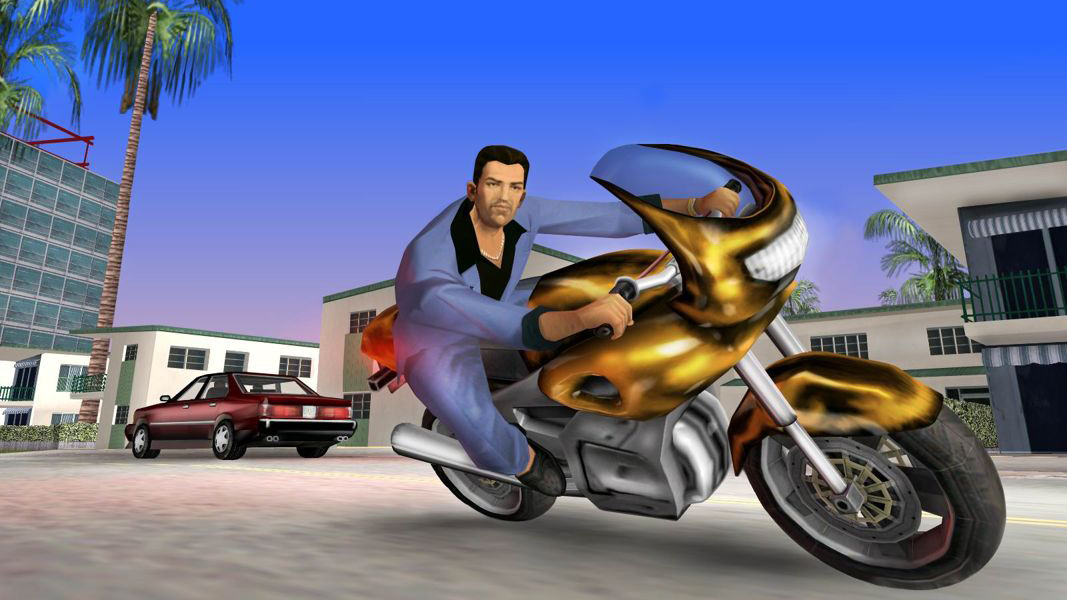Our Verdict
Near-perfect at everything it does, but wisely limits its remit. A great conversion.
PC Gamer's got your back
In 2003, I didn't appreciate how good Ray Liotta was in the role of Tommy Vercetti, Vice City's loudmouth protagonist. I did think he was hilarious, but only looking back do I realize how different, and how natural, his performance was compared to the Command & Conquer cutscenes I grew up on. Even 20 years later, Liotta's performance runs circles around the likes of Crime Boss: Rockay City.
Former PC Gamer reviewer Alec Meer didn't quite agree with me, calling Liotta a "so-so" actor (Goodfellas, Alec!? Cop Land?? C'mon!). But context is key. In the early 2000s Liotta was certainly on a streak of so-so movies, and it was really his stand-out performance in 2019's Marriage Story that reinvigorated his career. Meer goes on to highlight the "legendary" Dennis Hopper, also in Vice City, and I think it's safe to say Liotta has since entered that canon, too.
Liotta will always be best-known for Goodfellas, except among a very specific audience—teenagers who played videogames in the early 2000s. Even if Vice City is an unabashed knock-off of Scarface, it was the clear start of Rockstar's ambition to tell Hollywood-caliber mobster stories using real Hollywood actors. No wonder it scored a rare 93% in PC Gamer.
Here's our original review, published in the July 2003 UK issue of PC Gamer magazine.
Publisher Rockstar Games
Developer Rockstar North
Price £35
Minimum system PIII 800, 128Mb RAM, 32Mb 3D card
Recommended P4 1.6GHz, 256Mb RAM, 64Mb 3D card
Multiplayer None
Web address www.rockstargames.com/vicecity/pc
Release Date Out now
I've been naughty. I've been bad. I've even been evil. I've lied to parents and I've lied to girlfriends. I've stolen, I've threatened, I've cheated. I even once tried to beat up the one boy in the school (probably the nation) smaller and weaker than me with a Tupperware lunchbox full of Dairylea sandwiches.
Now I regret everything and nothing. But in Vice City, at least I have an excuse for being a terrible, horrible person. I see a yellow car—surely the rarest, and in my needy, materialistic world view, therefore the most coveted automobile colour—and I can't help but lightly brush against the door handle as I pass, testing it gently with tremulous, questing fingers, smiling slightly and just... wondering. And I know why. Why I feel the urge to impassively beat to a pulp with her own handbag the woman with the pushchair impeding my progress through WH Smith. And. I. Feel. Good. Because not only can I mercifully go home and safely live out every single violent fantasy that my head has space for on my PC, but now I can do it while hollering in baritone insanity, "THERE'S NOTHING THAT A HUNDRED MEN OR MORE COULD EVER DO. I BLESS THE RAINS DOWN IN AFRICA, GONNA TAKE SOME TIME TO DO THE THINGS WE NEVER HAD."

You are Tommy Vercetti, recently released from stir and making his way in Vice City. Various employers offer you work in a non-linear fashion, with individual missions leading into short story arcs. Typically, these stories ultimately end with you taking over an opposing crim's estates and business in Scarface fashion.
To not like this game is to hate videogames. To like it means you are a twisted little individual, and a blasé, mass-market conformist like the rest and best of us. But don't worry, that's fine. I'm fully aware that this is, after all, a game in which you can kill a lot of people and do some driving and shooting—but in a more entertaining way that anywhere else. Granted, it's not without its flaws: repetitive missions, some dodgy AI and physics, and city interactivity is limited by its PS2 origins. Most prominently, it's a repeat performance of a show we've seen four times before, albeit one that's light years ahead of its predecessors.
Production values are insanely high.
But then Vice City really is spectacular, and possibly the most polished game you're likely to see this side of a Brasso factory. The production values alone are insanely high. The presumable cost of all the Hollywood actors, from the so-so (Ray Liotta) to the legendary (Dennis Hopper) and the sublime Tourettism of Luis Guzman, together with the 100-plus tracks of '80s hits, is mindboggling, and a harsh reminder of just how populist Grand Theft Auto III was, no matter how much it felt like it was yours, heart and soul.
But that's irrelevant. Almost. The lurking, irrepressible problem that dogged the grimy but alluring hells of GTA III and held it back from real greatness is now gone. The last game would seemingly only run on one in three PCs, and probably only if it had been built by the screwdriver of the gods. Now it's almost impossible to recall the jerking and stuttering, the screwed-up fogging or the illegible text—Vice City runs smoothly and beautifully, although it's scarcely worth playing if you're not using a halfway decent machine.

While the conversion to PC suffers from the removal of the game's social element (it's more difficult to have a group of people clustered around a monitor and laughing at flippant killings than it is around a huge telly), the play is taken to a new level by mouse support. The ability to snipe precisely (you can now even shoot out tyres or through windscreens; mind you, so can the cops) is essential to feeling like an invincible lord of gangland. In addition, the difference between driving and action is more decisively divided as you switch from gamepad or keyboard to mouse and WASD and back, depending on your mode of transport. Vehicles remain the violently bruised meat of the game, of course, and are generally better honed and less dependent on courier tasks, but it's the city itself that provides you with such free-roaming independence. Vice is far larger than Liberty, and there's always something new to discover—an army base, an airport, buildings you can now wander inside, even an arena featuring GTA-ised versions of NASCAR and Stunt Car mini-games. There are, sadly, a few ill-advised additions—the RC choppers are irritatingly unwieldy to fly, the hidden packages extraneous, and some of the latter race missions prove ludicrously difficult to finish. But these are exceptions.
The city's all there to wander through and shower in blood without consequence, yet it never feels as uncomfortably purposeless, moronic or largely unfunny as Postal 2 at any point. While it's quite blatantly the same game as Grand Theft Auto III, but with gigantic, neon, ultra-buffed bells strapped to its beefed-up torso, that doesn't ever hold it back from being one of the most mesmerising and consistently entertaining games on any platform, ever.
Good or evil, we just don't mind—because it has class, and that's surely more important. —Alec Meer


Near-perfect at everything it does, but wisely limits its remit. A great conversion.

Wes has been covering games and hardware for more than 10 years, first at tech sites like The Wirecutter and Tested before joining the PC Gamer team in 2014. Wes plays a little bit of everything, but he'll always jump at the chance to cover emulation and Japanese games.
When he's not obsessively optimizing and re-optimizing a tangle of conveyor belts in Satisfactory (it's really becoming a problem), he's probably playing a 20-year-old Final Fantasy or some opaque ASCII roguelike. With a focus on writing and editing features, he seeks out personal stories and in-depth histories from the corners of PC gaming and its niche communities. 50% pizza by volume (deep dish, to be specific).


